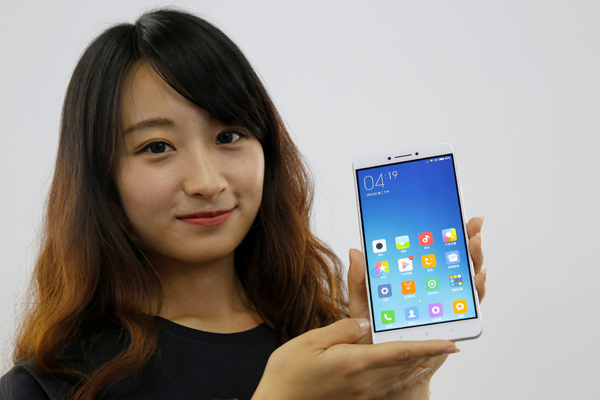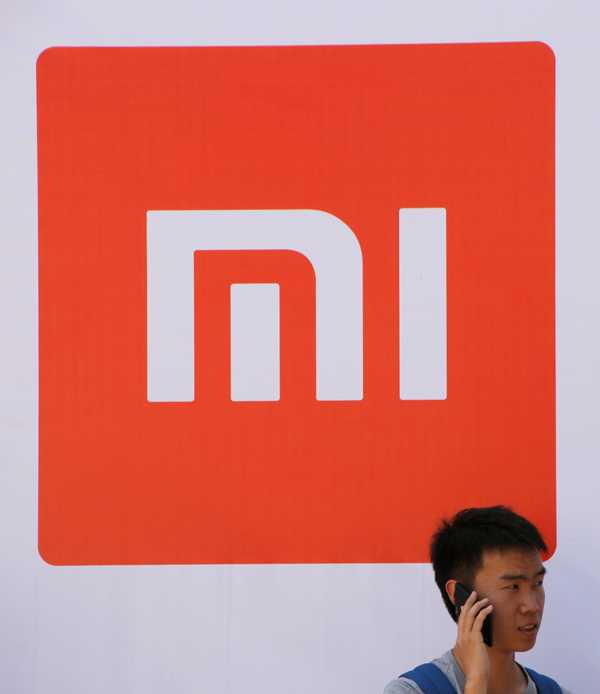Xiaomi battles rival on mobile payments
Updated: 2016-08-31 07:37
By MA SI(China Daily)
|
||||||||
 |
|
A staff member of China's mobile company Xiaomi poses with its new model Mi Max at its launching ceremony in Beijing, May 10, 2016. [Photo / Agencies] |
Xiaomi Corp will soon become the first Chinese smartphone vendor to add a mobile payment service to its handsets, pitting itself against foreign rivals Apple Inc and Samsung Electronics Co, which have already launched similar services.
The Beijing-based company said on its official microblog on Tuesday that it will launch MI Pay on Thursday by partnering with China's No 1 bank card association, China UnionPay.
Using near-field-communication or NFC technology, MI Pay will allow consumers to pay bills simply by holding their smartphones near point-of-sale terminals. It can be linked to credit cards and debit cards from 10 banks, the company said.
With MI Pay, consumers can also use smartphones as transportation cards to take buses and subways. A Xiaomi employee familiar with the matter told China Daily that the transportation service is already ready in Shenzhen and Shanghai and under tests in other four cities.
The move came as smartphones look and operate largely the same and players are looking to offer more diversified services to differentiate their products. Xiaomi's largest domestic rival Huawei Technologies Co Ltd also said last month that it would soon launch similar payment services.
 |
|
A man uses a mobile phone in front of the logo of Xiaomi in Beijing. [Photo / Agencies] |
Li Chao, an analyst at research firm iResearch Consulting Group, said China's mobile payment market is dominated by internet heavyweights Alibaba Group Holding Ltd and Tencent Holdings Ltd.
"NFC-enabled payment services are still quite new in China because local consumers have been using Alipay and Tenpay (mobile payment applications developed by Alibaba and Tencent) for a long time," he said.
Alipay and Tenpay enable consumers to pay bills by scanning codes with smartphones.
"It is quite difficult to change consumers' preferences and user habits," Li said.
In February, Apple launched NFC-enabled Apple Pay on the Chinese mainland. Later, Samsung also made a similar move. But so far, the two firms have only gained a limited presence in the payment sector, according to Jin Di, an analyst at research firm International Data Corp China.
The move also came as Xiaomi struggles with declining shipments amid mounting competition from rivals and a slowing smartphone market.
Wang Liming, a 25-year-old programmer in Beijing, said: "I take the subway to my workplace every day. The application of MI Pay in the transportation sector is quite appealing, but not enough to persuade me to buy a Xiaomi smartphone."
- Brazil leader's impeachment trial enters final stretch
- 94th anniv. of Victory Day marked in Turkey
- Merkel opens Germany's 17th Confucius Institute
- France's outgoing minister vows to 'transform' France
- One dead, three wounded in blast at Chinese embassy in Kyrgyzstan
- Tainted food sickens 37 Buddhist monks, 2 helpers in Cambodia

 'World's most dangerous village' draws visitors
'World's most dangerous village' draws visitors
 Chinese female pilots fly fighter-bomber JH-7
Chinese female pilots fly fighter-bomber JH-7
 African trainees learn lion dance in NE China's Dalian
African trainees learn lion dance in NE China's Dalian
 Left-behind children back to hometown after spending summer with family
Left-behind children back to hometown after spending summer with family
 Top 10 wealthiest countries in the world
Top 10 wealthiest countries in the world
 Princlings go to school
Princlings go to school
 Chinese painters capture beauty of Hangzhou
Chinese painters capture beauty of Hangzhou
 1,150-meter-long 'floating bridge' created
1,150-meter-long 'floating bridge' created
Most Viewed
Editor's Picks

|

|

|

|

|

|
Today's Top News
Trump outlines anti-terror plan, proposing extreme vetting for immigrants
Phelps puts spotlight on cupping
US launches airstrikes against IS targets in Libya's Sirte
Ministry slams US-Korean THAAD deployment
Two police officers shot at protest in Dallas
Abe's blame game reveals his policies failing to get results
Ending wildlife trafficking must be policy priority in Asia
Effects of supply-side reform take time to be seen
US Weekly

|

|









